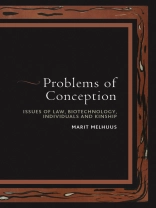The Biotechnology Act in Norway, one of the most restrictive in Europe, forbids egg donation and surrogacy and has rescinded the anonymity clause with respect to donor insemination. Thus, it limits people’s choice as to how they can procreate within the boundaries of the nation state. The author pursues this significant datum ethnographically and addresses the issues surrounding contemporary biopolitics in Norway. This involves investigating such fundamental questions as the relation between individual and society, meanings of kinship and relatedness, the moral status of the embryo and the role of science, religion and ethics in state policies. Even though the book takes reproductive technologies as its focus, it reveals much about vital processes that are central to contemporary Norwegian society.
Table of Content
Preface and acknowledgements
Chapter 1. Framing the issues
- Introduction
- Kinship – a new beginning?
- Some other issues
- Law/imagination
- The involuntary childless
- Some reflections on the precautionary principle and a bit more
- The state of Norway and the notion of equality
Chapter 2. Children of one’s own
- A first encounter
- Having an own child
- An issue of sameness
- An own child – a first approximation
- To try everything; to tell or not to tell
- What makes a child your own?
- Drawing together
Chapter 3. Better safe than sorry
- Uncomfortable relations
- Legislative process: acts and revisions
- Artificial insemination by donor – pro et contra
- Bringing the past to the present
- The making of a law
- The first revision – 1994
- Second and third revisions: 2003 and 2007
- In sum
Chapter 4. The inviolability of motherhood
- Establishing parenthood
- Of eggs and sper
- Mater semper certa est
- Disruptive effects
- Pater vero? Turning the tables
- By way of conclusion
Chapter 5. The sorting society: knowledge, selection, ethics
- Reproductive choice
- The sorting society
- A parliamentary incident
- Looking back: a few comments on eugenics
- The law and the Church
- Ethical dilemmas/ethical publicity
- Some final remarks
Chapter 6. Concluding reflections – and a Postscript
- Global reach – local appropriation
- Facts and values
- Controversies – contested sites
- Post script – legal (un)certainties
Chapter 7. Some notes on methodology
References
Public documents cited or consulted
About the author
Marit Melhuus is Professor of Social Anthropology at the University of Oslo. She has previously worked in Argentina and Mexico, focusing on issues of development, economic anthropology, gender and morality.












